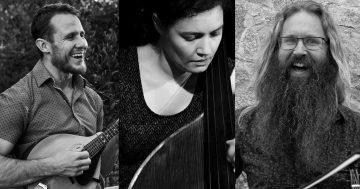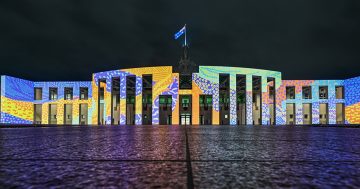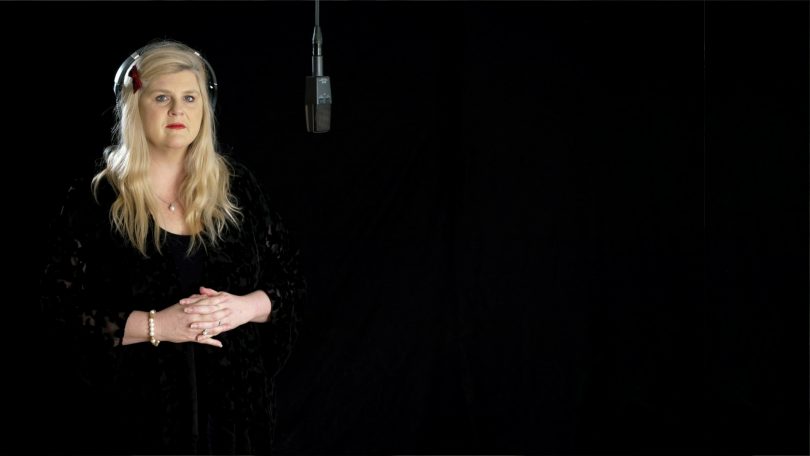
Susan Ellis from The Griffyn Ensemble. Photo: Supplied.
During the past 12 months, The Griffyn Ensemble has collaborated with eight of Australia’s leading First Nations creators, transforming words spoken in Australian Parliament into song for Songs from a Stolen Senate.
Having these artists generously share their take on national identity, with topics ranging from climate change to genocide, is a humbling experience.
“It is a way to respond to this issue of deaths in custody and have power – to protest and voice our stories,” says Yuin composer Brenda Gifford.
As a 35-year-old white Canberran, how do these First Nations perspectives impact my creativity and life as an Australian? What right do I have to answer such a question when I am steeped in white male privilege?
This question was posed to me when Songs from a Stolen Senate was first performed online last year. The reception was extremely positive, however we were also confronted by sinister groups on social media who directed vitriol towards us and First Nations Australians for promoting these works.
I won’t repeat such awful comments, but will say it was an eye-opening experience. I’ll never know what it’s like to walk in the shoes of a First Nations Australian, but this made me wonder what it must be like to have to deal with such hatred every day just because of the colour of one’s skin.
One provocative comment about our artistic exchange stood out: “Isn’t this a bit of a oxymoron… ur stating issues of Aboriginal culture while u have a all white band… seems ur just having a ride on ye old bandwagon? [sic]”.
Perhaps the comment was motivated by vitriol, but it also asked a confronting question: as a white Australian, what relationship do I have to the tens of thousands of years of culture in this country, and to its custodians?
As the comment correctly identifies, the performers in Songs from a Stolen Senate are white Australians, and the composers are First Nations Australians. It is a challenging distinction since we are all artists who want to work with one another and share perspectives with a broader public.
The project draws together artists who are long-term collaborators, and these collaborations are not determined by the colours of our skin, but by an alignment of creative spirits that develops through artistic exchange – one that can’t be planned or sought.
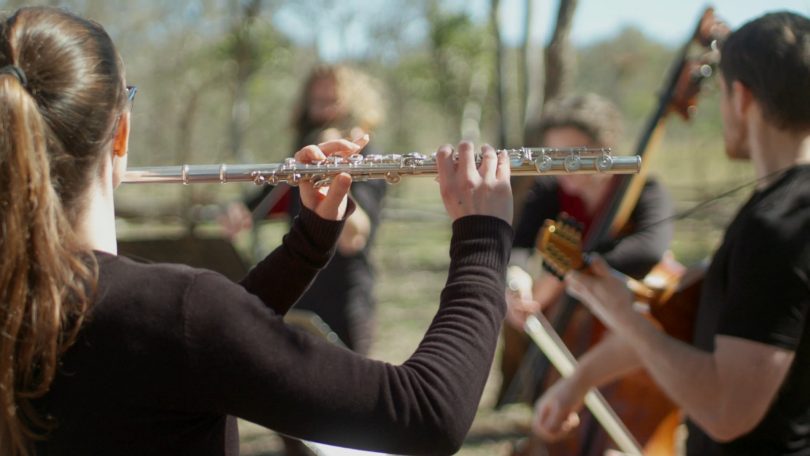
The Griffyn Ensemble performing. Photo: Supplied.
For example, Griffyn Ensemble performers Chris Stone and Holly Downes have worked with Noongar singer-songwriters Gina Williams and Guy Ghouse for years. Hearing them write music to the words, “They have no word for stolen, they have no word for freedom, what kind of civilisation is this?” affords a depth of insight into our history that we could not otherwise experience.
Performing the sounds of eucalypt leaves to signal the historic Barunga Statement between Bob Hawke and First Nations leaders, as written by Dharug composer Christopher Sainsbury, is breathtaking. These spine-chilling works arise from collaborations between likeminded artists that explore our national psyche.
Are these works informed by the artist’s unique voice, or is this because of their First Nations background, as the original comment alluded to? No doubt it is both, but does it matter? Would Jimmy Barnes be the same artist if not for his cultural upbringing in the slums of Glasgow?
We are all influenced by our background and stories. In addition to their incredible artistry, which should be considered national treasures, these artists bring culture and knowledge from the longest living history on the planet, combined with culture and knowledge from their Anglo-Celtic heritage, as Aranda country music legend Warren Williams keenly points out.
By listening to such voices, perhaps we will share perspectives that bring us all closer to the land, history and spirit of the country we reside in. If collaborating with these artists means jumping on a bandwagon, then so be it – it’s one I hope you can join us on.
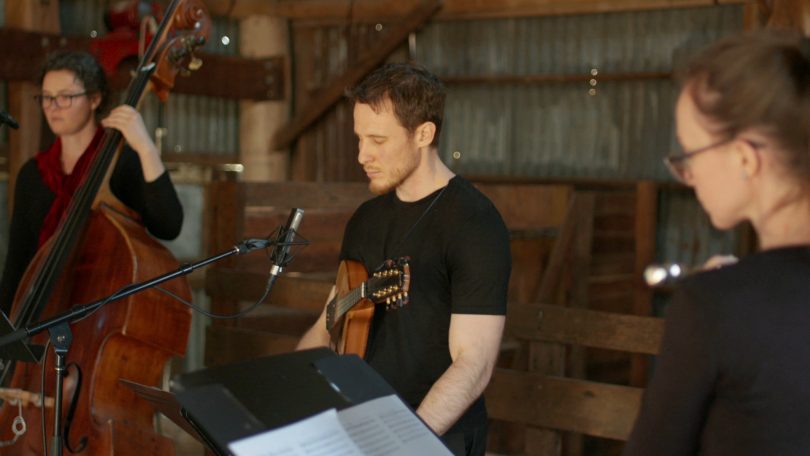
Michael Sollis, centre, from The Griffyn Ensemble. Photo: Supplied.
Great art affords discoveries and insights into ourselves and the world around us. For me, reconnecting with Ngunnawal artist Richie Allan – who I had played football with more than a decade ago – was a life-changing experience, and gave me an awareness and connection to the culture of the land where I was born, something I have embarrassingly not felt in my white-privileged upbringing.
Regardless of background, perhaps art and creativity gives us all the chance to listen to each other and connect to the land where we live.
Surely we will be more richer for having done so.
Songs from a Stolen Senate will have its live performance premiere at The Theatre, Belconnen Arts Centre, at 7 pm on Saturday, 13 March, 2021. Tickets are currently available here.
Michael Sollis is Director of The Griffyn Ensemble.












